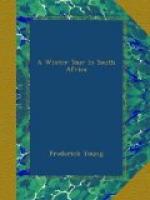would also be the handmaiden of civilization to others
as well, because in it there was no idea of aggrandisement.
He had recently made a most remarkable tour through
this interesting country, and since he landed
in Cape Town, on the 24th May, had seen a great
deal of it. He had visited Kimberley, and gone
down in a bucket to see one of the diamond mines; he
had travelled to Vryburg, and across the treeless
desert in the south-western portion of the Transvaal
to Klerksdorp; thence on to Johannesburg and
down the gold mines, and further on to Pretoria, where
he had an interview with President Kruger, and attended
meetings of the Volksraad. He had been 150
miles north of Pretoria, and dwelt for a fortnight
in the open veldt, without going near a house,
and had seen the Kafirs in their kraals. He had
crossed the Transvaal, through Heidelburg and
Newcastle, in Natal, down to Durban, he had visited
Port Elizabeth and Grahamstown, and had now returned
to Cape Town. What he had seen of this great country
had astonished him, and he thought it had a vast
future before it; but it required to be governed
in the most enlightened and satisfactory manner,
and he appealed to both races—Dutch and
English—to co-operate and unite in
developing its wonderful resources. It was by
this way alone—by cordial co-operation and
a generous feeling towards one another, that
this would be realized. He believed that Imperial
Federation would be the best solution of the difficulties
which had arisen. He had heard whispers of
what was called Republicanism. We worshipped
words rather than things; but the British Constitution,
especially when it would be expanded by Federation,
would be practically a Republic with a Queen as President.
He would, therefore, appeal once more to the judgment
of thoughtful men to weigh the principles contended
for, calmly, wisely, and without prejudice or
passion. The flippant, the superficial,
the thoughtlessly ambitious, and those who did not
take a fair, judicial, and comprehensive view
of the great issues involved in it to each portion
of the Empire over which the British Crown held
sway, might deride and condemn it, but he, as one of
its most ardent pioneers and supporters, recommended
it to all colonists as well as to his countrymen
at home, as the best preservation of their commercial,
social, and political interests in the future,
which they would lose altogether if they abandoned
it in favour of the disintegration of the British
Empire. He had studied this question for
some years, and by a sort of instinct he felt
that it was the right thing to be brought about.
He had brought before them proofs that some distinguished
men were already feeling the desirability of
some such thing being effected, and he could
not but help thinking that their ranks would be augmented
by other people of influence and power, who may
hereafter be brought to think seriously and carefully
over this great question. He took the opportunity
himself, some three years ago, to put a letter in




